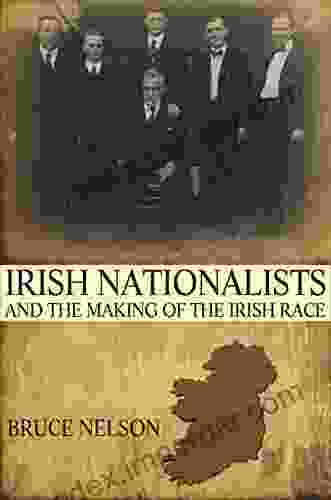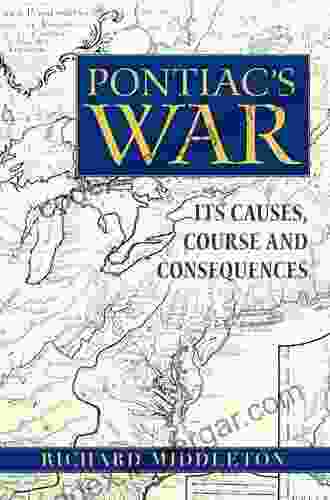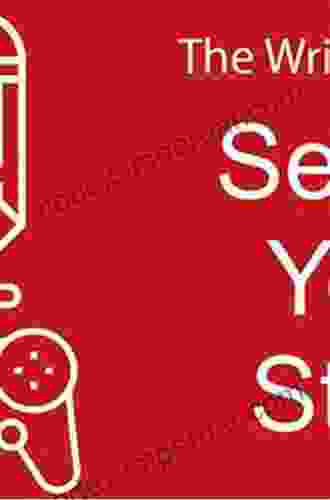Irish Nationalists and the Making of the Irish Race: A Deep Dive into the Formation of a Nation's Identity

5 out of 5
| Language | : | English |
| File size | : | 2396 KB |
| Text-to-Speech | : | Enabled |
| Screen Reader | : | Supported |
| Enhanced typesetting | : | Enabled |
| Word Wise | : | Enabled |
| Print length | : | 327 pages |
The story of Ireland is a tapestry woven with the threads of a rich and complex history. At the heart of this tapestry lies the enduring flame of Irish nationalism, a movement that has shaped the very fabric of the Irish race throughout the centuries. From the early stirrings of Celtic identity to the modern-day struggle for unity, Irish nationalists have played a pivotal role in defining the essence of what it means to be Irish.
In this comprehensive exploration, we delve into the captivating world of Irish nationalism, tracing its origins, examining its key ideologies, and exploring the impact it has had on the making of the Irish race. Through the lens of historical events, we will uncover the motivations, aspirations, and sacrifices that have driven Irish nationalists over generations.
The Roots of Irish Nationalism
The seeds of Irish nationalism were sown in the fertile soil of Gaelic culture, a vibrant civilization that flourished in Ireland from the 5th to the 12th centuries. The Celts, a warrior society with a rich tradition of storytelling and artistry, held a deep connection to their land and its ancient legends. When the Normans invaded Ireland in 1169, they brought with them a feudal system that clashed with the Gaelic way of life, setting the stage for a long and bitter struggle for independence.
Over the centuries, the Gaelic Irish fought back against English rule, but their efforts were often met with brutal suppression. The most significant uprising was the Great Rebellion of 1641, a bloody conflict that resulted in the massacre of thousands of Irish Catholics. In the aftermath of the rebellion, the Irish were subjected to a series of punitive laws known as the Penal Laws, which sought to extinguish their culture and religion.
Despite the adversity they faced, the flame of Irish nationalism continued to burn. In the 18th century, the Society of United Irishmen emerged as a driving force for Irish independence. Led by Theobald Wolfe Tone, the United Irishmen advocated for a democratic republic that would unite all Irish people, regardless of their religion or background. Their ideals inspired the ill-fated Irish Rebellion of 1798, but it was ultimately crushed by British forces.
The Irish Renaissance
Following the failed rebellion of 1798, Irish nationalism entered a period of decline. However, the early 19th century witnessed a cultural revival known as the Irish Renaissance. Writers such as William Butler Yeats, James Joyce, and Lady Gregory celebrated Irish heritage, folklore, and language. The Renaissance fostered a renewed sense of Irish identity and provided a foundation for the rise of modern Irish nationalism.
The Home Rule Movement
In the 19th century, the Irish Home Rule movement emerged as a powerful political force. Led by figures such as Charles Stewart Parnell and John Redmond, the Home Rulers sought autonomy for Ireland within the British Empire. After decades of agitation, the Irish Home Rule Bill was passed in 1914, but its implementation was delayed by the outbreak of World War I.
The Easter Rising and the Irish Free State
The Easter Rising of 1916 was a watershed moment in Irish history. A group of Irish nationalists, led by Patrick Pearse and James Connolly, staged an armed uprising against British rule in Dublin. The Rising was ruthlessly suppressed by the British, but it ignited a new wave of support for Irish independence. In the aftermath of the Rising, the Irish Republican Army (IRA) emerged as a vanguard for the nationalist cause.
The Irish War of Independence (1919-1921) pitted the IRA against British forces in a bloody guerrilla war. The war ended in a truce and the signing of the Anglo-Irish Treaty in 1921. The treaty established the Irish Free State, a self-governing dominion within the British Commonwealth. However, the treaty was deeply divisive within the nationalist movement, leading to a bitter civil war that lasted from 1922 to 1923.
The Northern Ireland Conflict
The partition of Ireland in 1921 created two separate entities: the Irish Free State and Northern Ireland. Northern Ireland, which was predominantly Protestant, remained under British rule. The Catholic minority in Northern Ireland faced discrimination and violence from the Protestant majority, leading to decades of unrest and conflict known as the Northern Ireland Troubles.
The Troubles, which lasted from the late 1960s to the late 1990s, were marked by sectarian violence, bombings, and political assassinations. The conflict claimed the lives of thousands of people and left deep scars on the fabric of Northern Irish society. The situation began to improve in the 1990s with the signing of the Good Friday Agreement, which brought about a ceasefire and established a power-sharing government in Northern Ireland.
Irish Nationalism Today
Today, Irish nationalism continues to be a dynamic force in Irish society. The traditional goal of Irish unification remains unresolved, with different perspectives on how to achieve it. Some believe in a negotiated settlement between the Republic of Ireland and Northern Ireland, while others advocate for a more radical approach. The issue of Irish unity is likely to continue to be a topic of debate for many years to come.
Irish nationalism is a tapestry woven with the threads of history, culture, and aspiration. From the Gaelic warriors who fought against Norman invaders to the modern-day struggle for a united Ireland, Irish nationalists have played a pivotal role in shaping the identity of the Irish race. Their sacrifices, determination, and unwavering commitment to their cause have left an enduring legacy that continues to inspire and motivate generations of Irish people.
As we look to the future, the story of Irish nationalism serves as a testament to the enduring power of a people's desire for freedom and self-determination. May the flame of Irish nationalism continue to burn brightly, guiding the Irish race towards a brighter and more just tomorrow.
5 out of 5
| Language | : | English |
| File size | : | 2396 KB |
| Text-to-Speech | : | Enabled |
| Screen Reader | : | Supported |
| Enhanced typesetting | : | Enabled |
| Word Wise | : | Enabled |
| Print length | : | 327 pages |
Do you want to contribute by writing guest posts on this blog?
Please contact us and send us a resume of previous articles that you have written.
 Book
Book Novel
Novel Page
Page Chapter
Chapter Text
Text Story
Story Genre
Genre Reader
Reader Library
Library Paperback
Paperback E-book
E-book Magazine
Magazine Newspaper
Newspaper Paragraph
Paragraph Sentence
Sentence Bookmark
Bookmark Shelf
Shelf Glossary
Glossary Bibliography
Bibliography Foreword
Foreword Preface
Preface Synopsis
Synopsis Annotation
Annotation Footnote
Footnote Manuscript
Manuscript Scroll
Scroll Codex
Codex Tome
Tome Bestseller
Bestseller Classics
Classics Library card
Library card Narrative
Narrative Biography
Biography Autobiography
Autobiography Memoir
Memoir Reference
Reference Encyclopedia
Encyclopedia Leslie Woodhead
Leslie Woodhead C L Bragg
C L Bragg C Mahoney
C Mahoney Bonnie Ruberg
Bonnie Ruberg Brendan Lyons
Brendan Lyons Bonnie Myotai Treace
Bonnie Myotai Treace Reverend Mike Wanner
Reverend Mike Wanner Nolan Gasser
Nolan Gasser Bradley J Birzer
Bradley J Birzer Peter Salway
Peter Salway Boze Hadleigh
Boze Hadleigh Brian Skyrms
Brian Skyrms Brad Feld
Brad Feld C L R James
C L R James David Sloan Wilson
David Sloan Wilson Bruce Clark
Bruce Clark Jerry Menikoff
Jerry Menikoff Robin Leonard Bidwell
Robin Leonard Bidwell Bruno Snell
Bruno Snell Buzz Williams
Buzz Williams
Light bulbAdvertise smarter! Our strategic ad space ensures maximum exposure. Reserve your spot today!
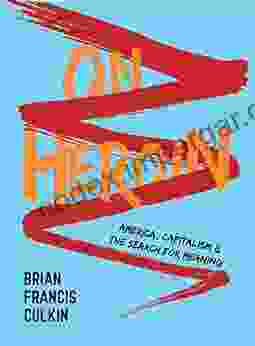
 Dillon HayesAmerica, Capitalism, and the Search for Meaning: An Eye-Opening Journey into...
Dillon HayesAmerica, Capitalism, and the Search for Meaning: An Eye-Opening Journey into...
 Robert Louis StevensonAnatomy & Physiology for Health Professions: An Engaging Journey into the...
Robert Louis StevensonAnatomy & Physiology for Health Professions: An Engaging Journey into the...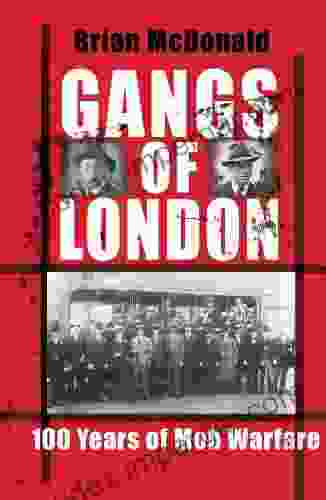
 Vincent MitchellGangs of London: The Captivating Chronicle of a Century-Long Mob Warfare Saga
Vincent MitchellGangs of London: The Captivating Chronicle of a Century-Long Mob Warfare Saga Ethan GrayFollow ·8.2k
Ethan GrayFollow ·8.2k Branden SimmonsFollow ·4.2k
Branden SimmonsFollow ·4.2k Allen GinsbergFollow ·10k
Allen GinsbergFollow ·10k Jeffrey CoxFollow ·12.7k
Jeffrey CoxFollow ·12.7k Evan SimmonsFollow ·14.8k
Evan SimmonsFollow ·14.8k Thomas MannFollow ·2.2k
Thomas MannFollow ·2.2k Aaron BrooksFollow ·6.8k
Aaron BrooksFollow ·6.8k Garrett BellFollow ·15.4k
Garrett BellFollow ·15.4k
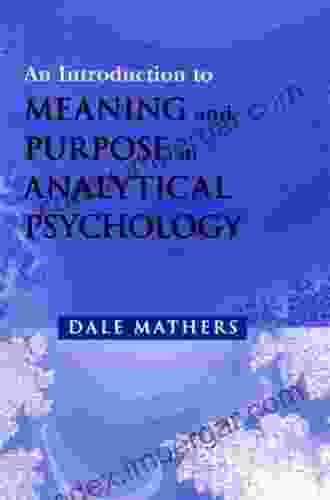
 Gary Cox
Gary CoxUnlocking Meaning and Purpose in Life: An Exploration of...
In an increasingly...

 Eric Hayes
Eric HayesMemoirs of the Early Pioneer Settlers of Ohio Illustrated
A Window into the Lives of Courageous...
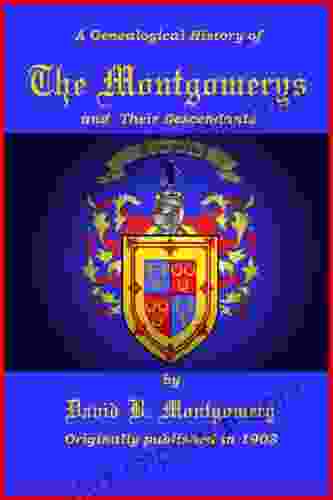
 J.R.R. Tolkien
J.R.R. TolkienThe Montgomerys and Their Descendants: A Saga of Courage,...
Prepare to be...
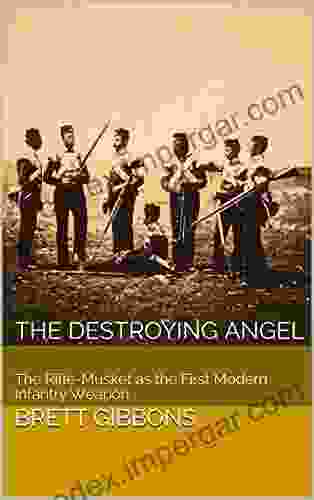
 Avery Simmons
Avery SimmonsThe Rifle Musket: The Dawn of Modern Infantry Warfare
: The rifle musket, a revolutionary...

 Jesse Bell
Jesse BellUnlock the Power of Excel with VBA and Macros: A...
Microsoft Excel is a powerful spreadsheet...
5 out of 5
| Language | : | English |
| File size | : | 2396 KB |
| Text-to-Speech | : | Enabled |
| Screen Reader | : | Supported |
| Enhanced typesetting | : | Enabled |
| Word Wise | : | Enabled |
| Print length | : | 327 pages |


